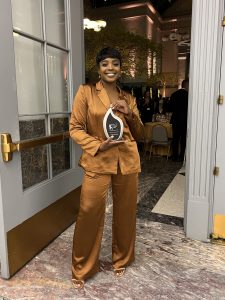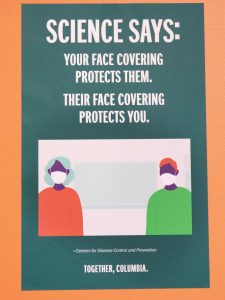By Curtis Black, Newstips Editor
Fifteen students, most of them from Orr High School, sat around a storefront in Humboldt Park last Wednesday night, taking turns role-playing situations encountered by security guards in their school – and discussing better and worse ways of handling them.
One student, portraying a guard, watched an argument between two students escalate into a fight and then roughly subdued one of the contenders, who ends up in a choke hold.
How often does this kind of thing happen, the students are asked. “Every day” is the response from several of them.
The students, members of the Blocks Together Youth Council, say they routinely witness or experience inappropriate behavior by school security guards. In a survey of Chicago Public School students across the city, they gathered reports of guards cursing and insulting students; sexually harassing them; failing to prevent fights, and even instigating and initiating them; and using excessive force, including beating and paddling students.
Too often security guard misconduct “contributes to an unsafe learning environment,” said Blocks Together Youth Council youth organizer Ana Mercado.
“Their approach leads to more conflict and tension,” she said.
And while she said there are guards who focus on problem-solving over punishment, “it’s not just a few bad apples who are unprofessional, it’s a natural extension of the zero-tolerance mentality.
“If you think kids only learn if you are harsh on them, if that’s the only recourse you have, then if it doesn’t work there’s nothing for you to do but go harder, and you end up beating kids up.”
Blocks Together Youth Council maintains that one of the most direct ways to promote a “culture of calm” in CPS high schools is to revamp security guard training to include an introduction to restorative justice principles. They say an interactive workshop format could help guards think through ways of reacting to immature and disruptive behavior in a professional manner.
And they’ve been pushing, with limited success, for a seat at the table as CPS revises its security guard training, arguing that young people’s perspective is crucial.
As participants worked through different scenarios – a student who shows up without a shirt, another who refuses to remove a hat – they talked about how to apply restorative justice principles, which were posted on hand-written signs around the room, the importance of listening, of relationships, of taking into account individuals’ needs, of problem solving, of considering the larger community, and of modeling the behavior you want to see.
The group had expected Michael Shields, chief of security for CPS, at the meeting. At a previous meeting, he’d asked for a demonstration of how restorative justice principles could be applied to training for school security guards, and this date was subsequently set, they say.
But when Blocks Together Youth Council called to confirm the meeting, they were told it wasn’t on Shields’ schedule, said Orr student Edward Ward. When they inquired at the school board meeting earlier that day, Shields spoke with them briefly and said something personal had come up that morning.
Ward noted the discrepancy – if it had come up that morning, why wasn’t it on his schedule days earlier?
“We’re angry about that,” Ward said.
On one wall of the office hangs a sheet with a list of agreements including Blocks Together Youth Council’s involvement in revising security guard training, and in monitoring and evaluating trainings, and ensuring that training includes an introduction to restorative justice, discussions of the developmental needs of youth and the proper role of adult professionals, and an interactive format. At the bottom is Shields’ signature.
Shields has since backtracked on several promises, Mercado said, including allowing group members to observe trainings. At the meeting last October where that agreement was signed, Shields also agreed to provide a copy of the current curriculum for guard training, said Blocks Together Youth Council, organizer Ana Mercado; to date, that promise hasn’t been kept, she said.
CPS spokeswoman Monique Bond couldn’t address specifics of discussions between Shields and the group but said a comprehensive review of security guard training is underway as part of the district’s anti-violence plan.
Misconduct by guards should be reported to teachers, principals or the district’s inspector general, she said.
“These are very serious allegations, and the only way to address them is to file a formal complaint,” she said.
“For young people there’s a lot of fear of backlash from security guards if they hear about a complaint,” said Mercado. “We’re trying to deal with the problem preventively.”
Blocks Together Youth Council has been supporting an effort to establish a confidential grievance process for students to report incidents of violence and harassment in school, a campaign being spearheaded by GenderJust, which has carried out a series of direct actions.
“Right now there’s not really a process,” said Sam Finkelstein, an organizer for the LGBT group. “You complain somehow, maybe you tell the principal and if you’re lucky, it gets acted on. There’s no followup, no oversight.”
Blocks Together Youth Council has worked on this issue for years (Newstips first covered their efforts in 2002), organizing high school youth, working to bring restorative justice to local elementary schools, helping to establish a peer jury at Orr High School. With limited administrative support and resources, school-by-school efforts have had limited success, Mercado said.
Now she wonders whether the call by CPS chief Ron Huberman for guards to act as mentors to students will be anything more than “lip service.”






Be First to Comment